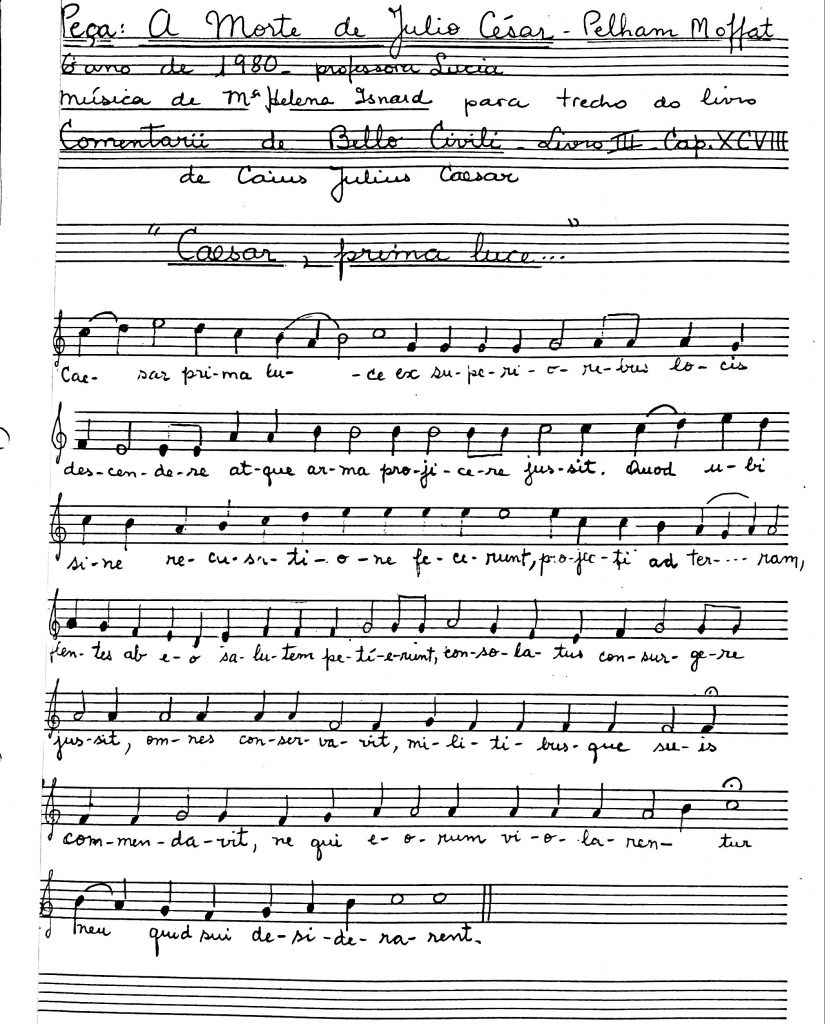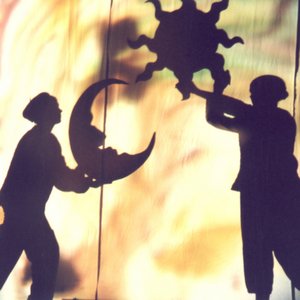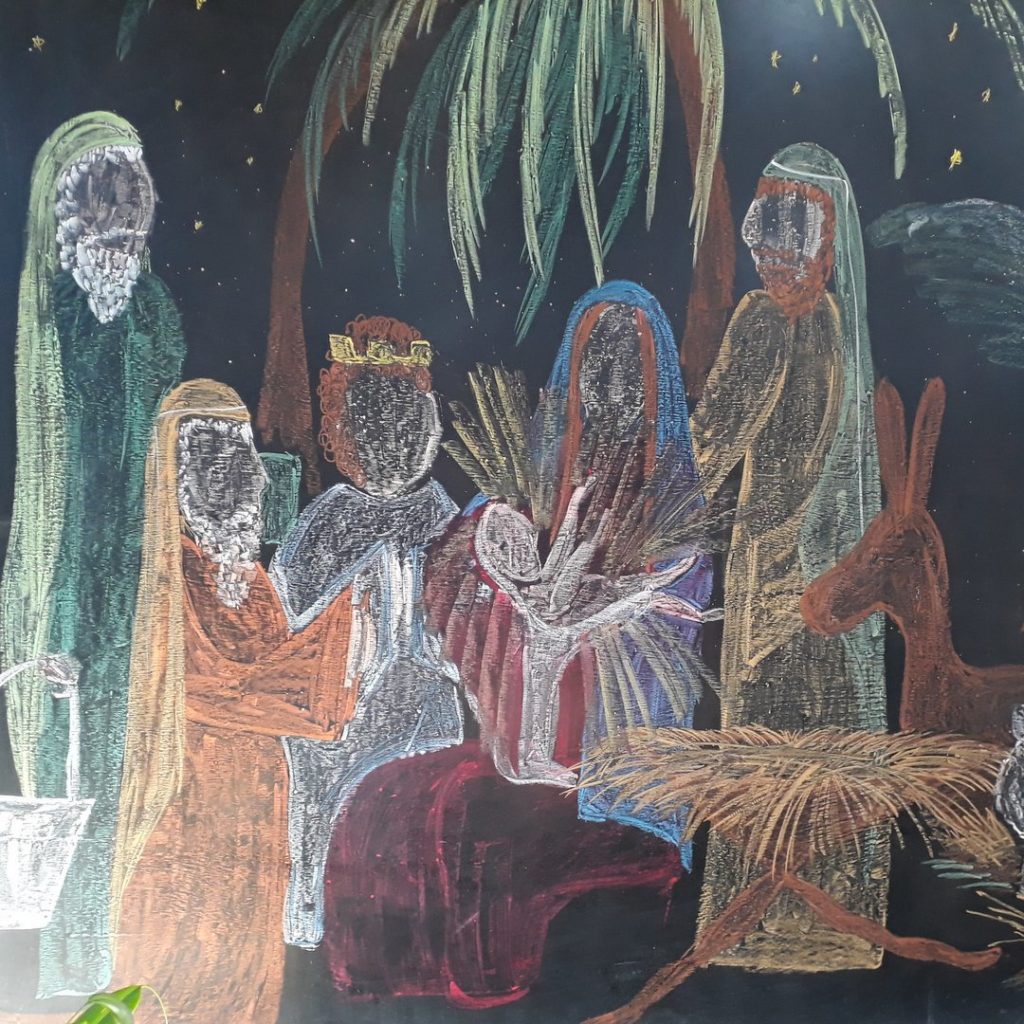Peça de Pelham Moffat
translation by Lucia Souza Leite Bruno
adaptation by Ruth Salles
This play was written by Scotsman Pelham Moffat, born in 1895. He started his life as a businessman, but left that occupation after losing an arm in the first world war. Studying works by Rudolf Steiner, he became interested in Education and helped to found a Waldorf School in Edinburgh. Teaching there, it was in the next twenty-six years that he wrote the plays published in the book “21 Plays for Children”. He left teaching in 1965.
This play simplifies the plot of Shakespeare's play for 12 year olds. In the Portuguese adaptation, after translation by Professor Lúcia Souza Leite Bruno, the piece was slightly reduced, and an Introduction was added, in which everyone sings an excerpt from Júlio César’s book “Commentarii de Bello Civilli” (Book III, chapter XCVIII). As the English language is more condensed than Portuguese, I found myself compelled to write the verses in a decasyllabic rhythm, which was not the author's intention, who made them in eight syllables. The singing music was made by the music teacher Maria Helena Isnard, but another one can be made by the music teacher of the class.
Ruth Salles
CHARACTERS
Julius Caesar Brutus
Calpurnia, his wife Decimus
Cassius bark
Trebonius Cinna
Mark Antony Metellus Cimber
Artemidorus The Soothsayer
Constance, handmaiden of Calpurnia
Caesar's House Butler
Three slaves and four slaves (one of them is Lucius; the fourth is Fulvio)
four roman citizens
Crowd of Romans (men and women)
INTRODUCTION
ALL (they solemnly say the excerpt from Julius Caesar's book “Comments
of the Civil War”)
– Julius Caesar finally ordered them
to step down from their positions
laying down arms. without hesitation,
face to earth, men were already crying
begging him for life. But he
he made them rise, yea, and comforted them,
and to his own soldiers he commanded
that they would not harm any of them.
(Singing of the same passage in Latin begins)
“Caesar, prima luce, omnes eos
ex superioribus locis descendere,
atque arma projicere jussit.
Quod ubi sine refusale fecerunt,
project ad terram,
flentes ab eo salutem petierunt,
consolatus consurgere jussit,
omnes conservavit,
mitilibusque suis commendavit,
ne qui eorum violarentur
neu quid sui desiderarent. »
SCENE 1
Room in Brutus' house.
Casca, Cassius, Brutus, Decimus, Trebonius.
SHELL:
– Friends, Rome is no longer the same.
Cincinnatus, leaving his plow
to drive out with your own hands
ancient enemies of this land,
had no ambitious thoughts
nor did he seek any reward.
Ah, this was the real Rome!
Now hearts have hardened,
and greedy hands intend to grasp
the power.
CASSIUS:
“But time is long gone, Casca,
in which the law was respected in Rome.
Today the laws are useless. just be
head of legions to violate them.
And it is on this throne that Caesar sits,
lord of all.
BRUTUS:
- Cassius, it was us
that we put it there. and the chains
that hold our hands today, ourselves
is that we forge them. In addition, Caesar
Was he not then merciful to all?
Didn't spare our lives, as we fought
next to Pompey? you must show me
greater reason for me to get up
hand to hurt a great friend.
DECIMUS:
– Which coachman, when he lets go of the reins
of a fiery horse, do not bridle him,
to see that he drags you down?
We, who gave Caesar power,
we must refrain from holding back
the race into which you rush?
BRUTUS:
– But, Decimus, what is this race?
To what abyss does Caesar drag us?
Peace reigns on all borders,
and Rome is sovereign throughout the world.
TREBONIUS:
– Yes, Brutus, we have peace. And freedom?
Do we have it too? Where is she?
The power of the senate, the voice of the people,
the influence of the consuls, now
where are? For I tell you today:
we will have a king again in Rome
if our slow hands hold back
leaving Caesar alive.
BRUTUS:
– So, Trebonius,
he deserves death. yes it deserves
always die whoever kills freedom.
However, this freedom will not be
also killed when we kill a tyrant?
Aren't we tyrants too?
– O you Fates, in whose terrible hands
shape our deeds, oh why
we are not given just to glimpse
the consequences of what we decided?
– If I join you now, friends,
killing the one I love like a son
love your father, remember, it is for Rome,
only for Rome that I will. (all leave)
SCENE 2
Caesar's house.
Steward, 3 Slaves, 4 Slaves, Calpurnia, Constance, Caesar, Decimus, Brutus, Mark Antony, Cassius.
(It is early in the morning; there is a bell sound; the butler enters, clapping his hands and shouting to the slaves as they enter.)
BUTLER:
- Go fast. the courtroom
of our master must be ready.
Polish these columns and the mosaics
from the ground. I don't want to see cobwebs!
We will! We will! (The butler exits.)
1st SLAVE:
- What a sumptuous supper
Caesar gave yesterday...
2nd SLAVE:
- Yea?!
3rd SLAVE:
- There was lobster
with asparagus and goose liver,
and roasted wild boar with apples,
all washed down with precious wines
very cold in the snow.
2nd SLAVE:
– And what's left?
1st SLAVE:
– Oh, nothing, for the noble guests
They took all the leftovers on napkins.
1st SLAVE:
– Caesar, then, was he very happy?
2nd SLAVE:
– He ate very little and was thoughtful.
When I served the wine around the table,
I heard very strange conversation.
They talked about death...
3rd SLAVE:
- Death?
2nd SLAVE:
– …and what kind of death they preferred.
Caesar stood aside, reading letters.
Once he looked around and said:
“I would rather die suddenly.”
3rd SLAVE:
– This will be difficult, because Caesar
It is as dear as it is well kept.
4th SLAVE:
- I never wanted to be
Emperor. I just would like
to have a car with four horses.
Ah, I would be a king, albeit a slave.
1st SLAVE:
– Would you like to be a driver?
by car, Fulvio?
4th SLAVE:
– Oh, I would like to!
And the best race among the best
would then be seen: Me there, standing!
Trumpets sound! the time comes,
and we left; my horses jump,
they are already in the most advanced position;
(The other slaves perk up and make gestures of encouragement)
my horse on the left then stumbles;
I encourage him and we make the turn soon
vertiginously and, like lightning,
I reach its end and turn again;
"The blue! Blue ahead!” all cry out;
a green car is coming and is already reaching me;
at the bend we collided; I hear screams;
the green car overturns, and my rival
roll in the dust.
THE SLAVES:
- The blue! Ahead Blue!
(Enter Calpurnia with servant Constance.)
CALPURNIA:
– What is this noise? What recklessness!
Keep up the service, Fulvio! Pike,
Go tell your master that I want him
talk alone! (slaves leave)
– Constance, stay here
and don't allow anyone to come
with Caesar, not even his friends.
Let no one enter the house!
CONSTANCY:
- Yes ma'am.
I will say that Calpurnia so commands. (Exit Constance.)
CAESAR (entering):
– So you called me, Calpurnia?
CALPURNIA:
– Julius,
the night was full of omens.
And in my dream were mirrored
all sorts of very sinister omens.
Oh, don't go to the Senate, I beg you!
CAESAR:
– Do you think they are omens for me?
Before I believe such terrible warnings
portend dangers to Rome.
Instead of dodging I should
to be where this storm is brewing.
CALPURNIA:
– Do you remember the words of the Soothsayer?
It is on the ides of March that you owe
be more cautious. And it's at that time
that we are.
CAESAR:
- But to me
that it may happen that I no longer have
faced a thousand times and defeated?
'Cause I'd rather die just once
to live in fear every hour.
The senate awaits me.
CALPURNIA:
- No! Do not go!
Tell me that you got sick now
and that you cannot go.
CAESAR:
– Do you want Caesar?
act like a coward and a liar?
CALPURNIA:
– The lie and the shame are mine alone. (she kneels)
CAESAR:
- He is well. Then send your message. (Exit Calpurnia)
SLAVE (entering):
“Someone is waiting for Caesar outside.
CAESAR:
- And why didn't you come in?
SLAVE:
- We had order
not to let anyone in.
CAESAR:
– Whose order came from?
SLAVE:
— From Lady Calpurnia. (Enter Calpurnia.)
CAESAR (to Calpurnia):
- But I can't even go to the Senate,
not even my door can be opened
to a friend of mine?!
(to the slave):
– Make Him Enter! (The slave exits.)
CALPURNIA:
– I had to talk to you alone!
I already sent the message to Marco Antonio.
Don't let a friend convince you
to break the promise.
CAESAR:
– Let him in! (Enter Decimus.)
DECIMUS:
- Hail, Caesar! So, did you get sick?
CAESAR:
– Not quite, Decimus. Nonetheless
I can't go out with you today.
DECIMUS:
– What do I say to the senators who are waiting for you?
CAESAR:
“Just tell everyone I'm not going.
But you can know it's Calpurnia
who is sick. atrocious nightmares
disturbed her, and in them she sees warnings
that a great danger threatens me,
if you leave this house.
DECIMUS:
– What omens
left you, madam, so distressed?
CALPURNIA:
– Three times I dreamed that in my arms
saw a corpse full of wounds.
It was Caesar. Then from your statue
blood flowed.
DECIMUS:
- But, ma'am,
the dream shows just like Caesar
gives his blood for us, sacrifices himself
by his subjects.
(to Caesar):
- It's a good dream,
of good omens, Caesar. However,
everyone will say from now on
that you will only take a step if Calpurnia
have pleasant-looking dreams.
(Enter Brutus, Mark Antony, and Cassius.)
CAESAR:
- Decimus spoke well. There's nothing else
that can stop me. And my friends
are arriving: Brutus, Mark Antony,
Cassius, everyone is welcome.
(to them):
- I beg you
please forgive the delay.
(to Calpurnia):
- My toga!
Do you see, Calpurnia, the escort that supports me?
Could you aim for better defense?
We will! It will be a joyful walk!
(They all leave. Calpurnia leaves on the other side.)
SCENE 3
A street.
Four citizens, Artemidorus, Soothsayer, Decimus, Cassius, Casca, Mark Antony, crowd waiting for Caesar.
1st CITIZEN:
– Which side does Caesar come from?
2nd CITIZEN:
– Comes from that.
“I have a petition to deliver to you.
3rd CITIZEN:
- And me too.
ARTEMIDORUS:
- For your own good,
I hope you read what I bring you.
4th CITIZEN:
– What do you ask?
ARTEMIDORUS:
– I cannot reveal.
4th CITIZEN:
– O soothsayer, show your arts!
Reveal what's in that petition!
SOOTHSAYER:
– My vision is not that far-reaching,
but today scares me.
1st CITIZEN:
– Here he comes. Come with Marco Antonio,
Brutus and Cassius and with many others.
(Enter Caesar and the senators.)
2nd CITIZEN:
– Read, noble Caesar, my petition!
3rd CITIZEN:
– O Caesar, hear my appeal!
CAESAR (to the Soothsayer):
- Friend,
behold, the ides of March have arrived.
SOOTHSAYER:
- They arrived, but they haven't left yet...
ARTEMIDORUS:
– Read this petition, O great Caesar,
before you go on your way.
DECIMUS:
- Man, how dare you stop
our ticket?
ARTEMIDORUS:
– Oh, read! No delay!
SHELL:
– If you have an urgent need to speak with Caesar,
do it in the right place, not on the street!
(All except Artemidorus and the Soothsayer leave)
ARTEMIDORUS:
- O Caesar, read, I beg you so much!...
(to the soothsayer):
- Oh, heavens, he doesn't know his fate,
you won't even know without reading what I bring you.
Ah… Caesar…
SOOTHSAYER:
- The stars have already spoken,
and the ides of March are arrived.
SCENE 4
The Senate.
Cassius, Trebonius, Decimus, Brutus, Cinna, Caesar, Metellus, Casca, Mark Antony.
(Enter Caesar and the senators.)
CASSIUS (in a low voice):
– Do not forget, Trebonius, to call
Mark Antony aside and pushing him away.
TREBONIUS:
– Mark Antony, I have something to tell you. (The two leave.)
DECIMUS (to the conspirators):
– Metellus Cimber will speak.
There is no time to waste, or we fail.
BRUTUS:
– Caesar is coming. So let's go round it up.
CINNA (the Shell):
– You will be the first to stab him.
Metellus Cimber will give you the sign,
oh bark.
CAESAR:
- Then we can proceed
already on the agenda?
METELLUS:
- Caesar, I have
an important request for me.
It's about Publius, my banished brother.
May he be forgiven and return to Rome.
CAESAR:
– Metellus, how many times have you asked
this favor? your heart doesn't see
public reason. if I don't usually
punish under the pressure of emotions,
I do not change under passionate entreaties.
BRUTUS:
– And my commitment to this cause, Caesar,
wouldn't that be enough for you?
CAESAR:
– How, Brutus? Is the cause also yours?
CASSIUS:
– O Caesar, let me also beg. (kneel down)
CINNA:
- And me too. (kneel down)
CAESAR:
– Why do you kneel?
Will I be beaten by sycophants?
Standing! Do not dishonor this Senate
with an attitude unworthy of a Roman!
Metellus has already heard my answer.
And enough!
BRUTUS:
– And that's all?
CAESAR:
– It's my last word.
(Metellus pulls off his toga.)
SHELL:
- It is true what you said,
for thou hast said thy last word. (stabs him.)
CAESAR:
– You, Casca, are vile! What does this mean? (the others stab him.)
Say it!… How many daggers!… Even you Brutus!… (falls dead.)
BRUTUS:
- It's done.
(Enter Trebonius.)
DECIMUS:
– Trebonius is coming.
(to Trebonius):
– What news do you give us about Mark Antony?
TREBONIUS:
– Mark Antony is gone, and many others,
knowing what happened today.
Rumors spread everywhere,
like a flame that spreads.
It is urgent to make public the reason
that led us to this.
CASSIUS:
- Well, let's go
to the streets, proclaiming: “Freedom
just returned to Rome again!”
SHELL:
– With weapons still bloodied,
let us show that tyranny is dead!
DECIMUS:
– May Brutus go ahead! Let's all go!
MARCO ANTÔNIO (enters):
– Stay! Before you hit the streets
let me speak. I don't know what it is
your intention and not whose will it be
the blood to be shed later,
but I want to hear from your own lips
if I'm on your list. However,
if you consider me your friend
and if you are ready to demonstrate
why did Caesar deserve death,
I, without reproaching you, give you my hands.
BRUTUS:
– Mark Antony, no sword of ours
is turned against you; not even
we intend the death of another man
but Caesar. If you were your friend,
you are part of us too. Because I,
that I have allied myself with others to kill him,
loved him as a son loves his father.
MARCO ANTONIO:
- I thank; and I am satisfied
if you allow me to talk about Caesar
at funerals.
BRUTUS:
- I certainly allow it,
as long as you are fair. and i will say
what are our reasons for killing him.
Time waits for us, friend. We will!
(All but Mark Antony leave. Outside, voices are heard shouting “Freedom has returned to Rome!”, “Tyranny is dead!”, “Caesar is no more!”, “Rejoice, citizens, for behold, the freedom!” As the sounds fade in the distance, Mark Antony approaches Caesar's body.)
MARCO ANTONIO:
– Ah, Caesar, if you only knew the turmoil
of human hearts, you would hear
the storm roaring in my chest.
You are so mute, yet you cry out for justice.
I swear, Caesar: I will not rest
until Rome is freed
of your enemies. all the talent
that I have in the words I focus
on that impulse. Goodbye! the book is closed
of your life, and it's time to write
another story on the blank pages.
SCENE 5
Forum.
All.
(Crowd listening to Brutus' speech. Mark Antony beside. Caesar's body lies in a coffin or funeral wagon.)
CROWD (of men):
– Hail Brutus who saved us from Caesar!
CROWD (of women):
– Death to Tyrants! Long live Brutus!
BRUTUS:
– I have already shown you all, my friends,
that by killing this man I loved
like a father, there was not in my dagger
evil intention, but love of Rome.
If I loved Caesar more than Rome,
it would be up to you all to reproach me.
He was honorable, he was brave,
but all disproportionate ambition
it's like a destructive cancer. That's why
we kill him, before this evil
grow and infect all of Rome.
So you must act with me too
if I do similar harm to Rome.
CROWD (of men):
– Honored Brutus!
CROWD (of women):
- Long live Brutus!
BRUTUS:
– To praise the great qualities
of Caesar, Mark Antony comes to speak,
as is customary at our funerals.
CROWD (sometimes men, sometimes women):
- We don't want to hear you! he was friend
of Caesar! Outside! Down with Mark Antony!
Death to Tyrants! We will follow Brutus!
BRUTUS:
– Mark Antony has our approval
to speak. I listened patiently. (Leaves.)
MARCO ANTONIO:
– Dear friends, my countrymen,
I don't come here to praise Caesar
nor to condemn him. I just come
talk about a great man who died.
And that's fair. Wasn't he the big one
conqueror of immense territories,
what brought a glory never seen
and countless riches for Rome?
He was a father to all; and yet
was ambitious in Brutus' words.
This ambition does not seem strange to you,
to do so much good to Rome?
Yet these men are honored
and give good reasons for what they do.
CROWD (of men):
- Is right. Really Caesar brought
much wealth to Rome.
CROWD (of women):
— And great glory!
MARCO ANTONIO:
'Perhaps your ambition was to be king!'
But three times I offered you
a golden crown, and three times
refused her. it doesn't seem strange to you
this ambition? But the noble Brutus
and your friends all agreed
where he was ambitious. and we know
who are honorable men, all of them.
CROWD (sometimes men, sometimes women):
- Refused the crown! Oh that Caesar
maybe it wasn't ambitious
as they say. It was wronged!
Let's hear Marco Antony again!
MARCO ANTONIO:
– Here lies the citadel shattered
who once was Caesar. Within these walls
lived a noble soul, a heart
inclined to piety. In the past,
everyone loved him, and no tongue
he had learned these vain gossip.
But Brutus and his friends were silent
the lips that could answer them.
I don't know what those lips would tell you,
but honorable men have already said
that he was ambitious. And sure enough
it is fair enough to kill the ambitious.
CROWD (of women):
– Ah… it’s true… Caesar was loved
for all of us. And it was wronged!
CROWD (of men):
– Honorable men… These are traitors!
Those are killers! Julio Cesar
needs to be avenged!
MARCO ANTONIO:
- My friends,
I must not induce you to such ideas
that do not do justice to all these
honorable men who killed Caesar.
I only tell you that Caesar loved you.
I have in my hands your testament
bequeathing to every citizen of Rome
seventy-five drachmas. to you all
Caesar therefore made him his heirs.
CROWD (sometimes men, sometimes women):
- Noble Caesar! We must avenge him!
Death to Brutus and all traitors!
MARCO ANTONIO:
- Silence! There is still more to say.
The testament refers to the woods,
to their orchards along the Tiber River.
And all this he leaves for you.
All this will be yours forever,
O Roman citizens! there was someone,
Was there ever anyone like Caesar?
CROWD (sometimes men, sometimes women):
– Ah!… Never!… Never!… Let's get revenge!
Let's set fire to the houses of traitors!
Vengeance!… Fire!… May they be killed!…
(Citizens leave.)
MARCO ANTONIO:
– O fire and destruction, vengeance and death,
spread your wings over us,
and so may your spirit rest in peace,
oh Caesar!
END

****




